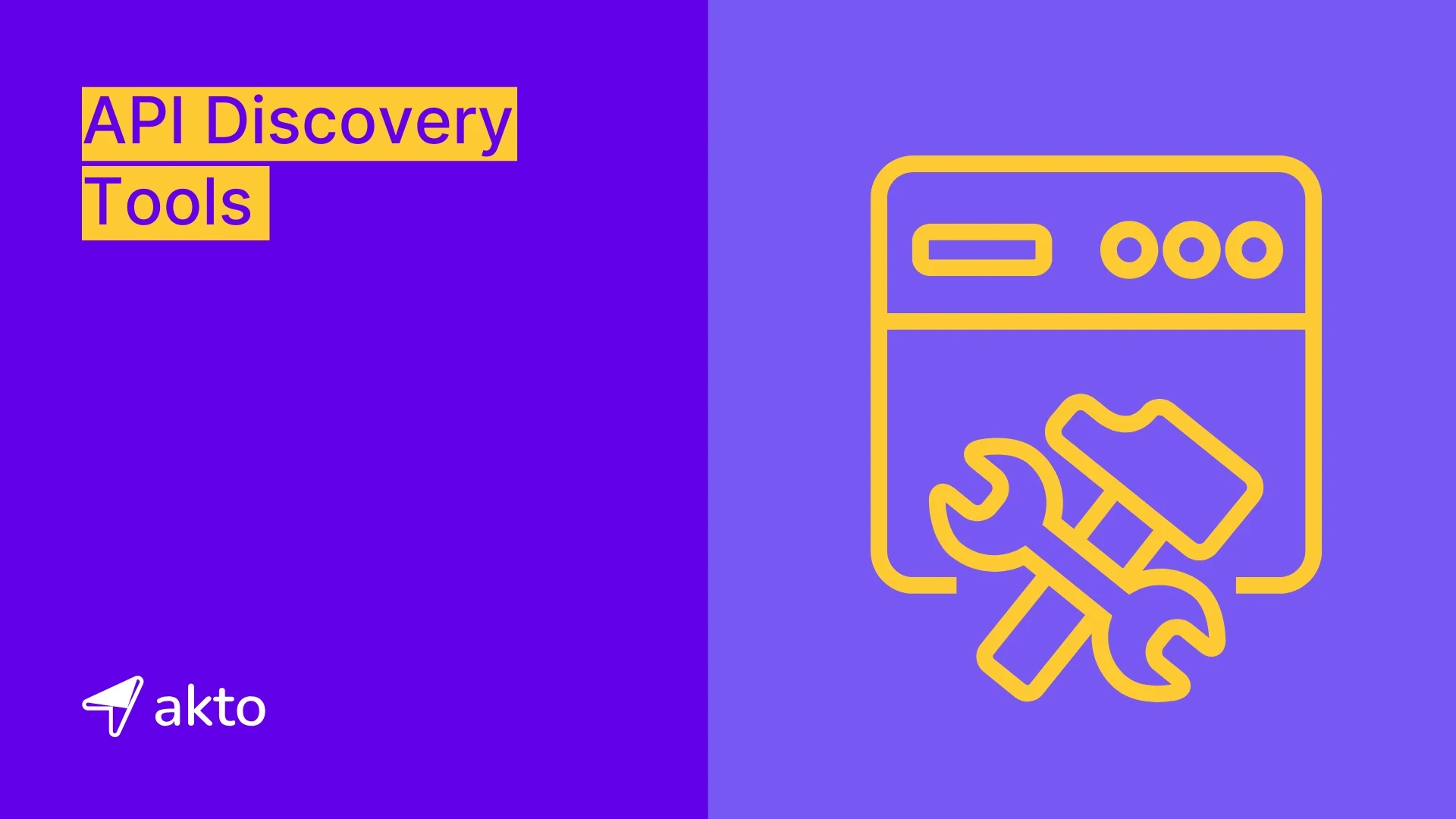Organizations use API Discovery Tools to recognize and handle Application Programming Interfaces (APIs) within their digital infrastructures. Finding the correct API can make or break a project to speed up development, add new features, or improve system integrations. Developers often find manually locating, assessing, and integrating APIs time-consuming and complex, leading to inefficiencies.
This blog examines the leading 10 API discovery tools, detailing their capabilities, categories, and selection criteria to help you understand how to find APIs effectively.
What are API Discovery Tools?
API discovery tools allow organizations to keep track of all the APIs in their systems on automation and find and validate them. Through these tools, one can validate all the APIs from public, private, partner, and even shadow, which are undocumented APIs.
They enable organizations to track, record, and secure all APIs, making API discovery easier even if the APIs are spread out in different applications and services.
Best API Discovery Tools
Akto – Comprehensive API Security and testing platform
Cloudflare - Global Web Infrastructure and security company
Postman – API development and testing tool with security features
Wallarm - Integrated App and API Security Platform
Boomi - Cloud-based Integration Platform as a Service (iPaaS)
Gravitee.io - Open-source API Management Platform
Apigee - Comprehensive API Management Platform
MuleSoft - All in One Integration and API Management Solution
WSO2 API Manager: Open-source API Management Platform
API Management, Azure - hybrid multi-cloud management platform of APIs
Let's explore some of the premier API Discovery vendors that enhance API management capabilities:
1. Akto
Akto is among the best API discovery tools and API security platforms that help organizations monitor and secure APIs in real-time. Most tools are designed to find and test APIs, but Akto focuses on API security by offering an ongoing API inventory with real-time vulnerability testing. It is for organizations working with microservices architectures and environments based on the cloud, where API sprawl is a big issue.
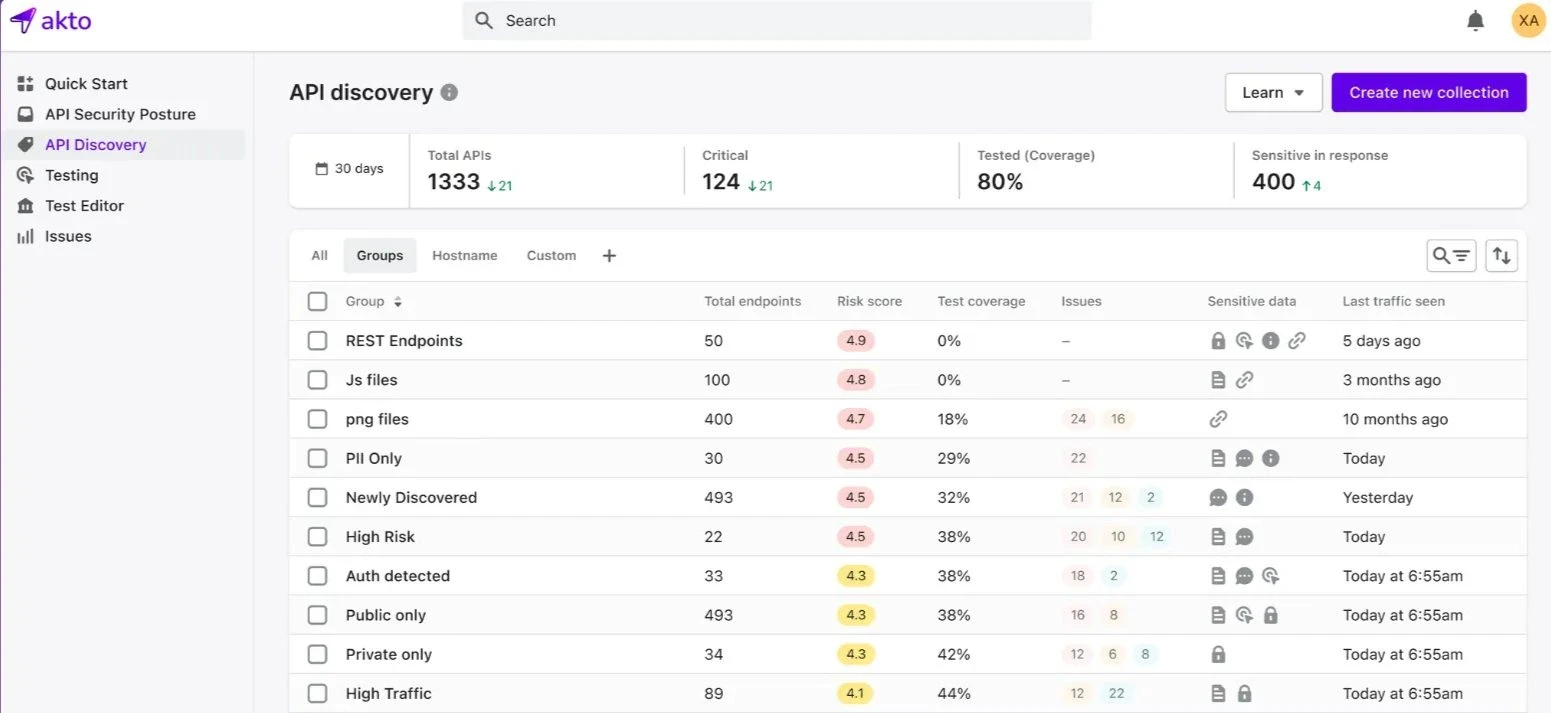
Key Benefits
Real-time API Inventory: It automatically discovers all active APIs in an organization, including the hidden and undocumented ones. This ensures that the security engineers are aware of the API environment; therefore, it minimizes the chances of missed APIs during the development process.
Improved Security: Akto easily integrates into
CI/CD pipelinesand can automatically test through the development cycle and find security weaknesses early. Avoidance of costly breaches later.Rapid Integration and Testing: Real-time monitoring and API security testing eliminate the need for any kind of separate manual testing; this accelerates the overall development and integration.
Pricing
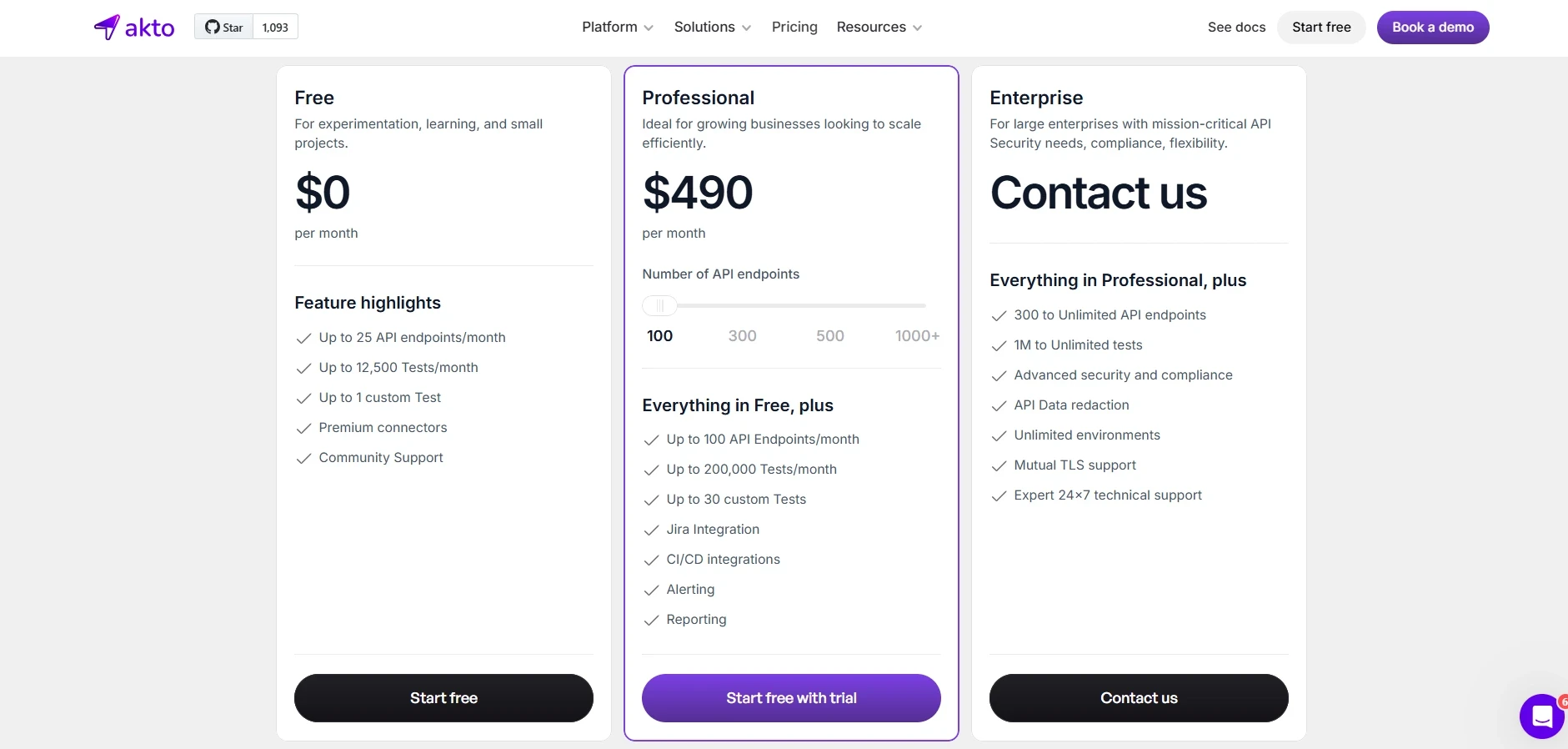
Akto offers flexible pricing plans for various organizational needs:
Free Plan: This plan is best suited for individuals or small teams who want to test the features of Akto or conduct light API security testing. It supports up to 25 API endpoints per month and allows for 12,500 tests per month. It is very feature-restricted, making it a better choice for a very small-scale developer or a small organization still discovering the whole idea of API security.
Professional Plan: It costs
$490 monthly. This professional plan supports100 API endpoints. Organizations are able to do200,000 tests monthlywith it. This can assist organizations in streamlining their processes concerning API security.Business Plan: This plan is made for big organizations that need strong security for their APIs. It provides advanced customization and premium features. Security engineers can ask for prices for this plan. It is for organizations that need strong API testing features and excellent support.
2. Cloudflare
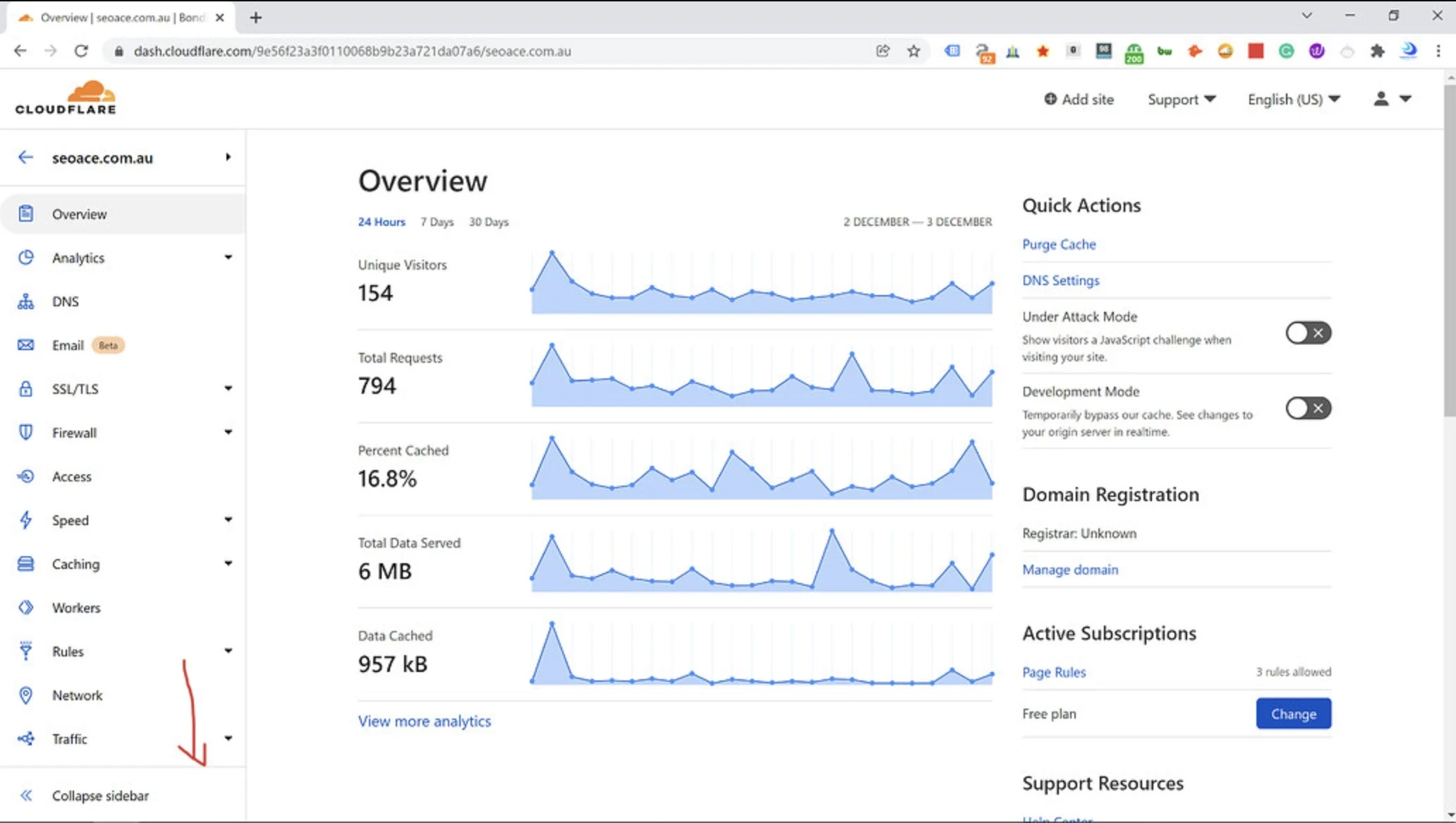
Image Source - Cloudflare
Cloudflare is an API Discovery tool, a leading global web infrastructure, and security company that offers several services designed to make websites, applications, and APIs perform better, safer, and more reliable. It supports millions of websites and offers services like content delivery networks (CDN), DDoS protection, and internet security to protect and improve digital assets. It offers Cloudflare API Discovery, which is useful for API visibility and security challenges.
Key Benefits of Cloudflare API Discovery
Real-time API Monitoring: Cloudflare records API usage regularly, so every communication is visible and monitored for possible vulnerabilities. This helps security engineers to know the API environment with accuracy. It reduces the chances of missing APIs in development.
Improved Security: Cloudflare integrates rather well with CI/CD pipelines, meaning it can automatically test any security breach within the
SDLC cycle; this also prevents future expensive breaches.Rapid Integration and Testing: It provides real-time monitoring along with API security testing that reduces the necessity for separate manual testing and thus accelerates the entire development and integration process.
Pricing
Cloudflare offers a wide range of plans for API discovery, uniquely tailored to different individual needs, each with specific features and pricing structures:
Free Plan: The basic plan includes services such as
SSL,CDN, andDDoS protectionthat will make it ideal for personal sites or blogs.Pro Plan: For professional websites and startups, it provides enhanced protection and performance. Cloudflare charges
$25 per monthfor its Pro plan. It also provides anannual subscription for $240, which corresponds to amonthly price of $20.Business Plan: For small e-commerce sites and organizations that require advanced security and performance, the Business Plan offers extra features and support. The cost is
$250 per month, and there is also an option to payyearly at $2,400, which is equivalent to$200 per month.Enterprise Plan: It is for large organizations with specific needs. Enterprise Plan provides adaptable solutions. Pricing is available upon request and can be flexible according to the requirements of the organization.
Akto's recommendation Cloudflare is more of API discovery tool in terms of protection from DDoS attacks as well as performance bottlenecks. Akto is offering detailed runtime monitoring with a risk score for the API. This provides an opportunity for the organization to identify the business logic vulnerability and the hidden threat, which may exist uniquely with APIs.
3. Postman
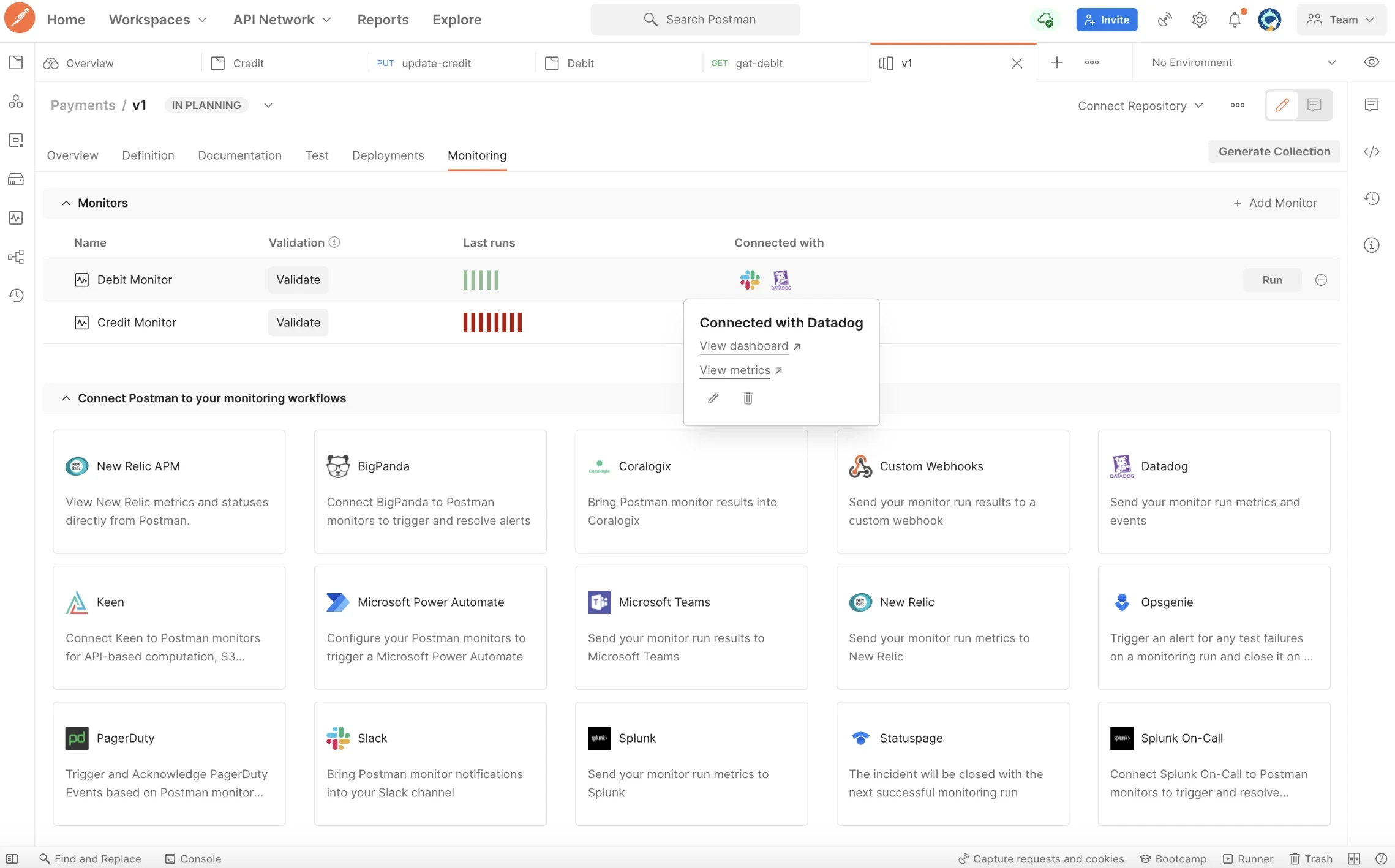
Image Source - Postman
Postman is a top API discovery tool for API development, testing, and documentation. It provides easy testing options for a complete API development platform. Postman allows security teams working on API-driven applications to collaborate and manage versions. The Postman API Network allows security engineers to find and use other people's public and private APIs, providing a wide variety of collaboration options.
Key Benefits
Powerful API Testing: Postman provides powerful testing tools by which security engineers can review API requests and responses accurately to ensure that APIs work properly and meet performance standards.
Collaboration and sharing: The tools of collaboration from Postman make it easier to share API sets, environment, and test results among other security teams to enhance teamwork as well as minimize identical efforts while developing the APIs.
Documentation: It offers complete API documentation for everyone to understand. It allows to use of API while reducing manual efforts to create documentation.
Pricing
Postman offers various pricing plans to accommodate various user needs:
Free Plan: Postman also offers a Free Plan to small teams for
up to three membersand provides them with essential API testing features at no cost.Basic Plan: At
$14 per user per month(billed annually), this plan allows for unlimited collaborators, connection based on cloud, and more limits on mock server and monitor requests.Professional Plan: Priced at
$29 per user per month(billed annually), it offers private workspaces, role-based access control, and additional packages to bigger teams.Enterprise Plan: For
$49 per user per month(billed annually), this plan provides advanced security features,single sign-on (SSO), audit logs, and customer success support for organization-wide API development.
Akto’s Recommendation
The Postman excels as a developer tool in organizing and testing APIs through its API collections and documentation capabilities. However, unlike Postman, Akto automatically discovers undocumented and shadow APIs in real-time, which gives an up-to-date inventory. This means that security teams will not miss any hidden endpoints and possible vulnerabilities, thus being more proactive on the issue of API visibility.
4. Wallarm
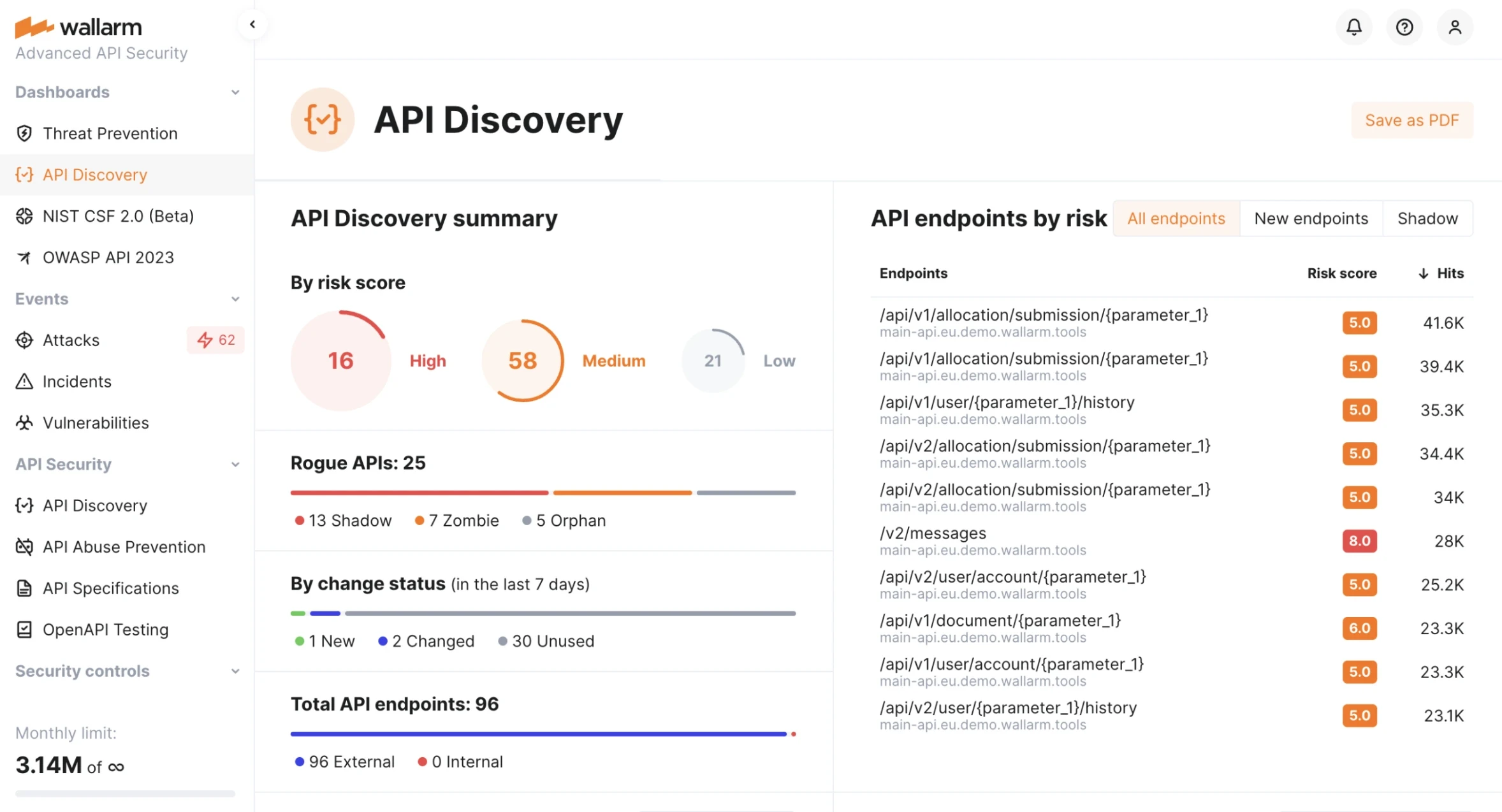
Image Source - Wallarm
Wallarm is an API security platform that provides regular threat detection and protection tools. It combines API discovery and security analysis to provide automatic protection for digital assets.
Wallarm uses machine learning to continuously monitor traffic, detect irregularities, and avoid security risks. It is particularly useful for organizations seeking adaptive security solutions that evolve with their APIs and infrastructure changes.
Key Benefits
Comprehensive API Security: Wallarm is an inclusive tool for API security because it gives real-time safety for APIs. It digs up possible malignant traffic, vulnerabilities, and anomalies. This tool protects the organization against new threats and makes sure that they have a strong security posture.
Regular threat detection: It detects threats regularly by machine learning and automatically blocks them. It protects APIs from both known and unknown attacks. The system continuously learns new patterns of attack and becomes more sensitive to its detection
Deep Reporting: This platform offers deep API security reports to help organizations find remediation advice based on the threats. Reports also serve as actionable recommendations, meaning teams can focus on vulnerable areas and thereby improve general security.
Pricing
Wallarm offers various subscription plans to match various security needs:
WAAP and Advanced API Security: It provides complete protection for web applications and APIs against common threats such as
SQL injection,cross-site scripting (XSS), andbrute force attacks. It supports all API protocols and addresses specific API threats, including those in the OWASP API Top 10. It offers features like real-time protection,DDoS mitigation, IP reputation feeds, virtual patching, and automated protection againstBroken Object Level Authorization(BOLA).API Attack Surface Management (AASM): It provides a complete view of publicly exposed APIs, this is an agentless solution that finds external hosts and their APIs, identifies missing Web Application Firewalls (WAFs), and detects credential leaks. The pricing depends on the number of external hosts, with the Core plan starting at
$325 per monthfor25 hosts. For those with bigger needs, an Enterprise plan is offered, which includes extended support and additional services.Security Edge: This plan allows users to use the Wallarm node in a managed environment, removing the requirement for on-site installation and monitoring. Wallarm handles node hosting and maintenance, providing robust traffic filtering, attack detection, and secure communication.
Free Tier: It is for smaller organizations and educational purposes, the Free Tier account allows processing
up to 500,000 requests per monthwith no time limitation. It gives access to the Wallarm other Advanced API Security features but doesn't offer some features like Security Edge Inline and Connectors, exposed assets scanner, vulnerability assessment, and API Abuse Prevention. Users can create a Free Tier account on either theUS or EU Wallarm Cloud.
Akto’s Recommendation
Both Wallarm and Akto integrate easily with CI/CD workflows and provide automated security testing. Wallarm focuses on runtime protection and mitigation, whereas Akto specializes in the early detection of vulnerabilities during the development cycle. Akto's ability to map vulnerabilities to CWEs and CVEs provides accurate insights to development and security teams, reducing the likelihood of false positives and simplifying remediation.
5. Boomi
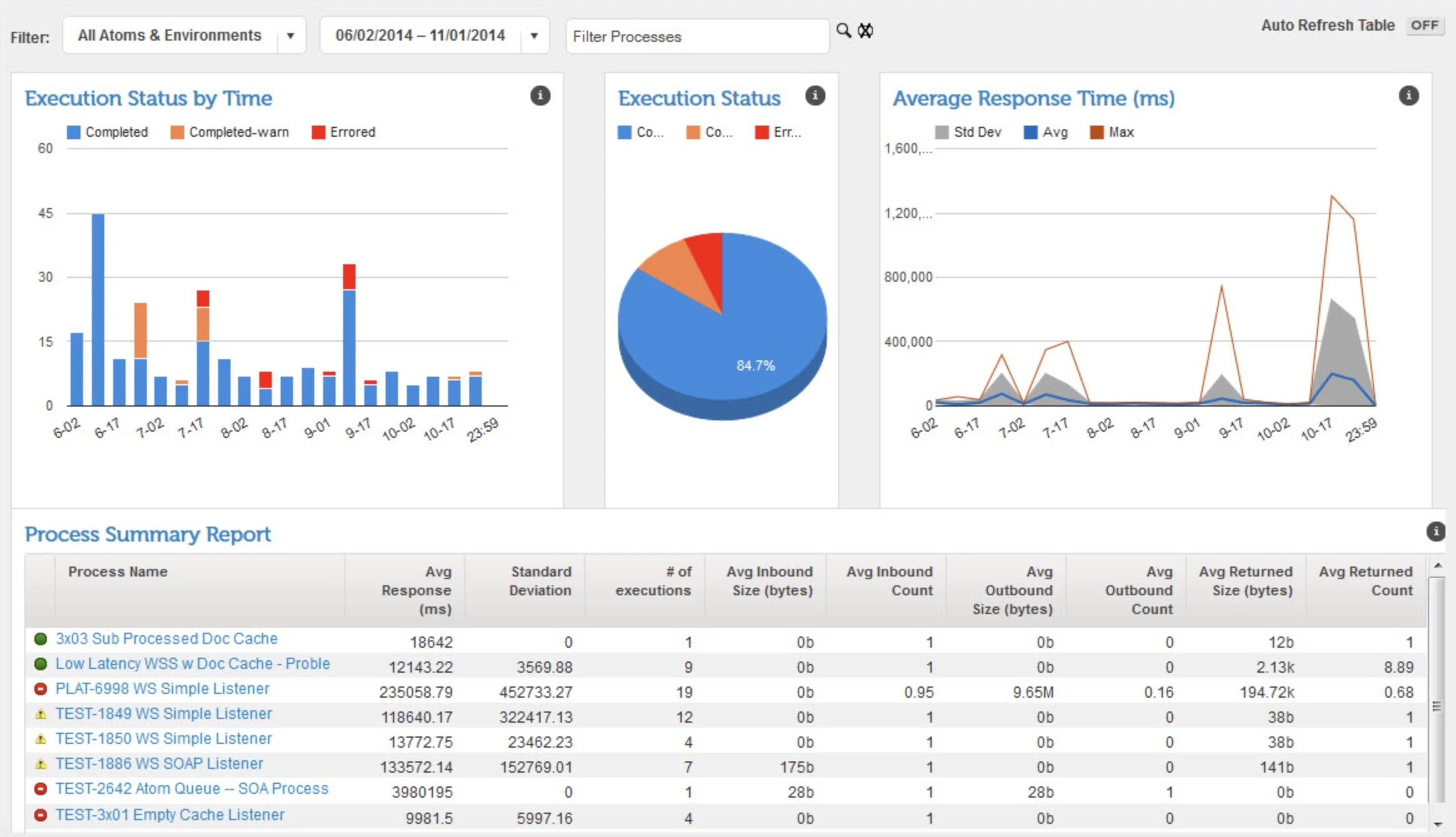
Image Source - Boomi
Boomi is an integration platform as a service (iPaaS) and based on a cloud platform. It focuses heavily on API administration. It enables organizations to simply set up, use, and handle APIs. Boomi allows organizations to connect apps, data, and devices in a secure, efficient, and simple while managing the API lifecycle. By incorporating a low-code approach along with its API Gateway, Boomi has become a very popular choice among organizations looking to improve their API-driven strategy.
Key Benefits
API Management: Boomi is also easy to deploy, monitor, and scale APIs because of its intuitive API Gateway and developer portal, making it a top API discovery tool. It has robust tools for managing policy, quota settings, and routing secure API traffic; this makes it easier for organizations to govern and optimize their APIs.
Comprehensive Integration: Organizations using Boomi can connect applications and data from anywhere within the cloud or on-premise environments; it ensures the smooth interaction of two systems and enhances functionality.
Workflow Automation: Boomi reduces manual efforts through automation and integration of organization processes to increase operational efficiency. Such a feature can be very useful in the workflow and productivity of teams.
Data Governance: The platform offers high-powered data preparation and master data management capabilities that help organizations maintain as high as possible data quality and abide by all the rules around data.
Pricing
Boomi offers flexible pricing plans to accommodate various business integration needs. The primary subscription tiers include:
Base: Designed for small organizations that require minimum integration.
Professional: For small-sized organizations that need improvement in integration features.
Pro Plus: This is for middle-sized organizations that require large integration capabilities.
Enterprise: It is for big organizations that work on multiple clouds.
Enterprise Plus: It is for complex and high-volume enterprise integrations.
Contact Boomi for detailed pricing. For organizations looking for flexible models, Boomi offers a Pay-As-You-Go model starting at $99 per month. It allows customers to use the entire platform without making an extended investment.
6. Gravitee.io
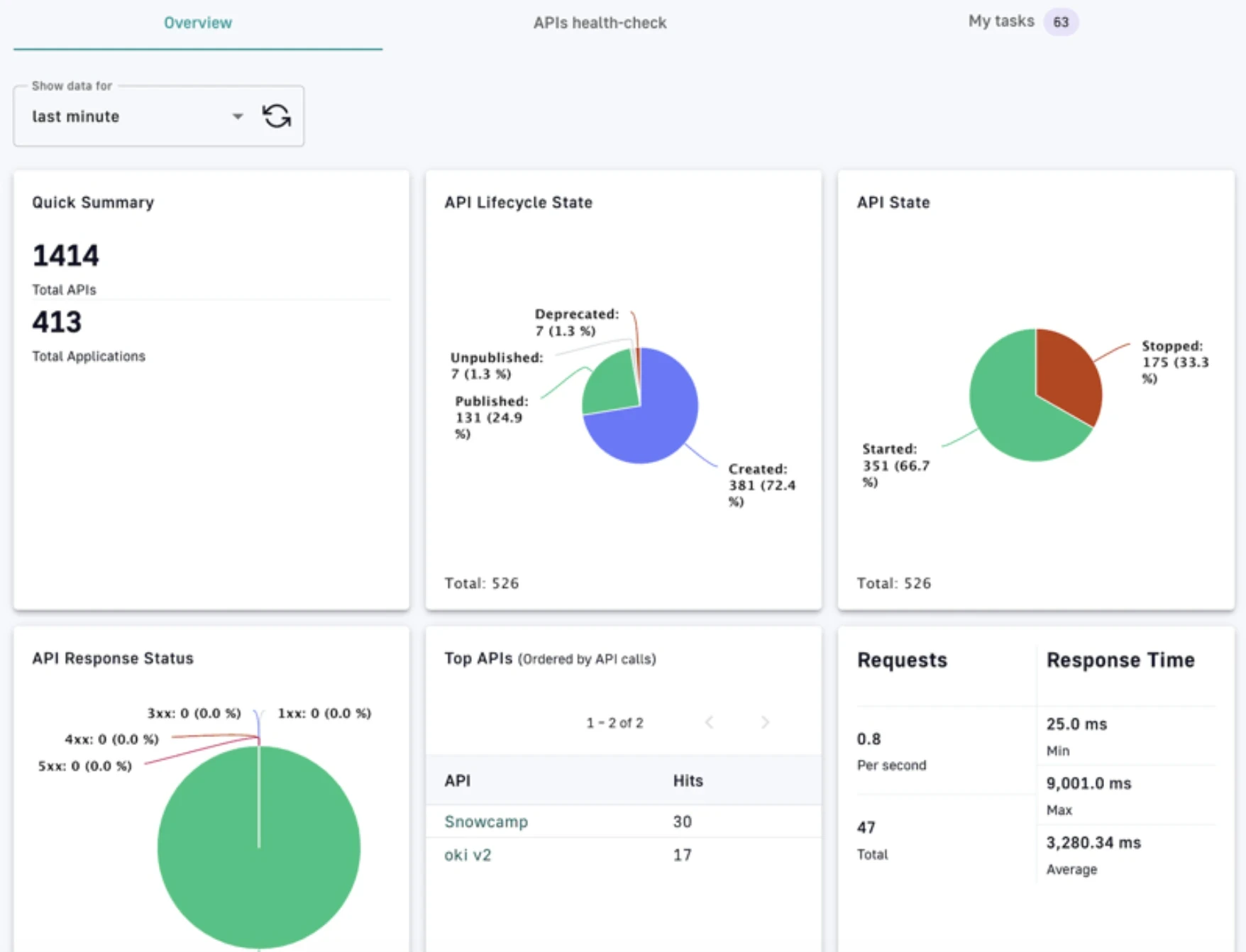
Image Source - Gravitee
Gravitee.io is an open-source, event-native API management platform that allows an organization to design, deploy, discover, manage, and secure their synchronous and asynchronous APIs throughout their overall life. It helps organizations manage a wide range of API protocols, API discovery, and patterns with a complete suite of modern API strategy tools.
Key Benefits
Unified API Management: Gravitee.io is one place to manage all APIs, such as
REST,SOAP,WebSocket, and event-driven architectures. It unifies all operations to make it easy to work with and provides consistent governance for all the interactions involving APIs.Flexible deployment options: It supports various deployment models, on-premises, cloud, and hybrid environments. This means that organizations have the choice of configurations best suited to their infrastructure and compliance requirements.
Event-Native Architecture: It supports event-driven APIs and allows to expose event broker resources as APIs for real-time data streaming and integration with event-driven systems.
Pricing
Gravitee.io offers tiered pricing that meets the needs of all types of organizations.
Planet: The price is $2,500 per month. Unlimited users, unlimited APIs under management, one production gateway, and gold support. Thus, it is for smaller organizations.
Galaxy: This offers one more production gateway and also provides more enterprise plugins that are designed for higher volume. Pricing details are provided upon request, allowing for customization based on specific needs.
Universe: This plan is for big organizations and it covers all features like unlimited users, APIs, production gateways, and all enterprise features. Pricing is customized to ensure cost-effectiveness for large-scale deployments.
7. Apigee
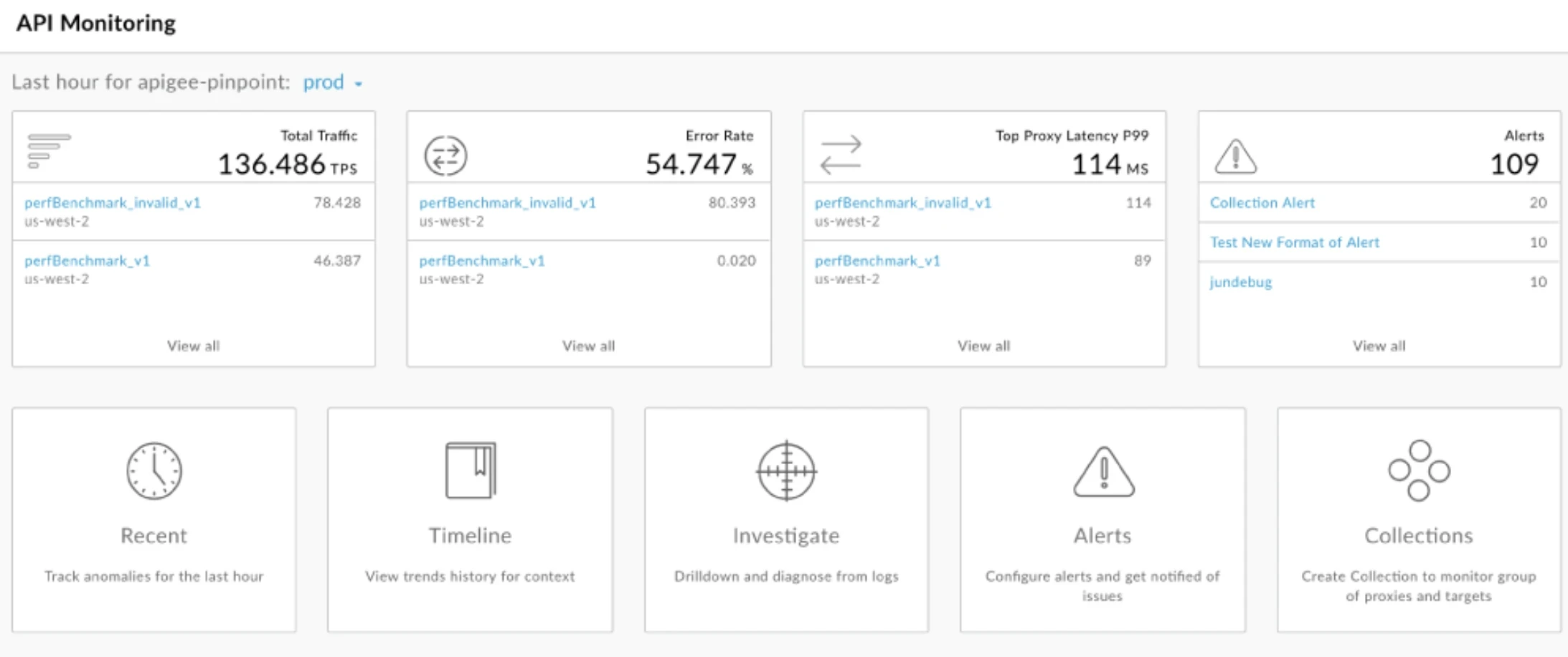
Image Source - Apigee
Google Cloud had designed the comprehensive API management platform known as Apigee for making secure, smooth, and scalable API deployments across different environments to ensure that organizations could design and deploy APIs with security performance robust enough to allow easy application integration and services.
Key Benefits
API Design and Development: Apigee provides all of the tools required to create regular, simple to use APIs. This allows organizations to create APIs that meet the demands of their businesses.
Security: Security features in Apigee include authentication, authorization, encryption, and threat prevention, which help to prevent unwanted access and API attacks.
Analytics and Monitoring: The platform gives analytics on the usage of APIs, monitors performance, and offers insights into how organizations are using APIs in order to make data-driven decisions and optimize API performance.
Pricing
Apigee is Google's API management platform, and it provides flexible pricing models to suit different organizational needs:
Evaluation plan: Free trial users to test the features of the products of Apigee through
zero-cost testing for 60 dayswith no risk.Pay-as-You-Go Pricing: It is offered in a flexible way in which the user pays on actual usage without any form of upfront commitment. Its key components include:
API Calls: The number and type of API calls determine the charges:
Standard API Proxy Calls: Lightweight proxies suitable for simple traffic, priced at
$20 per million callsforup to 50 million calls, with reduced rates for higher volumes.Extensible API Proxy Calls: Fully programmable proxies for sophisticated transformations, priced at
$100 per million callsforup to 50 million calls, with volume reductions available.
Environments: Deployment environments bill per hour per region, with three tiers:
Base Environment: It costs
$365 per monthper area and supportsup to 20 API proxies.Intermediate Environment:
$1,460 per monthper region, allowingup to 50 API proxiesor shared flows.Comprehensive Environment:
$3,431 per monthper region, accommodatingup to 100 API proxies or shared flows, with support for extra deployments.
Add-Ons: Optional features like API Analytics and Advanced API Security are added for enhanced functionality, each with its own pricing structure.
3. Subscription Plans: Apigee provides subscription plans for organizations with regular workloads.
Standard: Supports up to 1.25 billion Standard API Proxy calls or 250 million Extensible API Proxy calls per year, contains three environments, and provides a 99% SLA.
Enterprise: Supports up to 7.5 billion Standard API Proxy calls or 1.5 billion Extensible API Proxy calls per year, with six environments and a 99.9% SLA.
Enterprise Plus: Designed for large-scale operations, it allows up to 75 billion Standard API Proxy calls or 15 billion Extensible API Proxy calls annually, includes 12 environments, and guarantees a 99.99% SLA.
Akto’s Recommendation
Apigee, being a full-cycle API management platform, contains features such as authentication and threat protection. However, Akto offers more deep testing of vulnerabilities with more than 200 built-in tests, aligned with the OWASP API Top 10. Akto's focus is on proactive security, thus securing APIs before deployment in addition to the broader management capability by Apigee.
8. MuleSoft
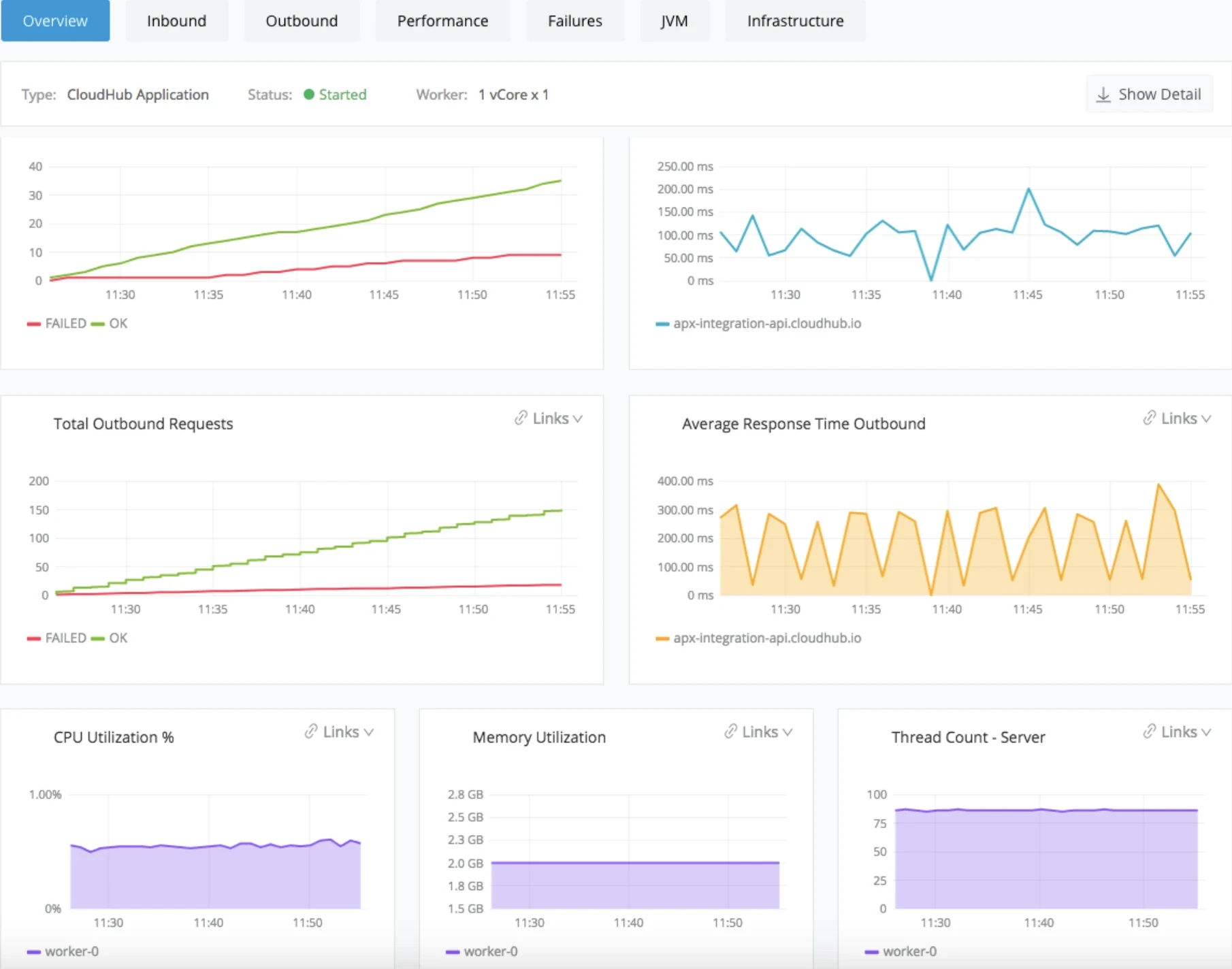
Image Source - MuleSoft
Anypoint Platform, by MuleSoft is an integration and API management platform, helping organizations not only in API discovery but also in design, deploy and manage APIs and integrations across a variety of environments. In this way, Anypoint Platform allows organizations to seamlessly connect applications, data, and devices, supporting organizations in the building and management of APIs throughout their entire lifecycle.
Key Benefits
Unified API Management: The Anypoint Platform offers a centralized interface for designing, deploying, and managing APIs. It ensures that all services have consistent governance and security. Unified approach to API oversight does simplify oversight of APIs with improved operational efficiency.
Comprehensive Integration Capabilities: The platform provides easy application, data, and device integration across on-premises and cloud environments. Organizations can connect different systems in their organization, thereby efficiently making data exchange possible and streamlining business processes.
Scalability and Flexibility: MuleSoft's architecture supports different kinds of deployment options, whether on-premises, cloud, or hybrid. This allows organizations to grow their integrations and APIs as needs evolve. As a result, the growth of the platform can keep up with the organization.
Pricing
MuleSoft offers a suite of products tailored to various integration and automation needs, with a significant emphasis on APIs.
Anypoint Platform
This comprehensive integration and API management solution is available in several editions:
Anypoint Integration Starter: Designed for organizations beginning their API and integration journey, this edition includes core features such as API design, management, deployment capabilities, and access to an asset marketplace for reuse. Pricing is customized based on specific organization’s needs.
Anypoint Integration Advanced: Building upon the Starter edition, this package offers advanced monitoring, log management, global multi-cloud deployment, clustering for high availability, and support for hybrid deployment models. Pricing is tailored to the organization's requirements.
API Management Solution: Focused on comprehensive API management, this solution provides full lifecycle API management, API standards enforcement, conformance, compliance with end-to-end API governance, and the ability to manage and secure APIs in any environment using Flex Gateway. Pricing is determined based on usage and specific needs.
9. WSO2 API Manager
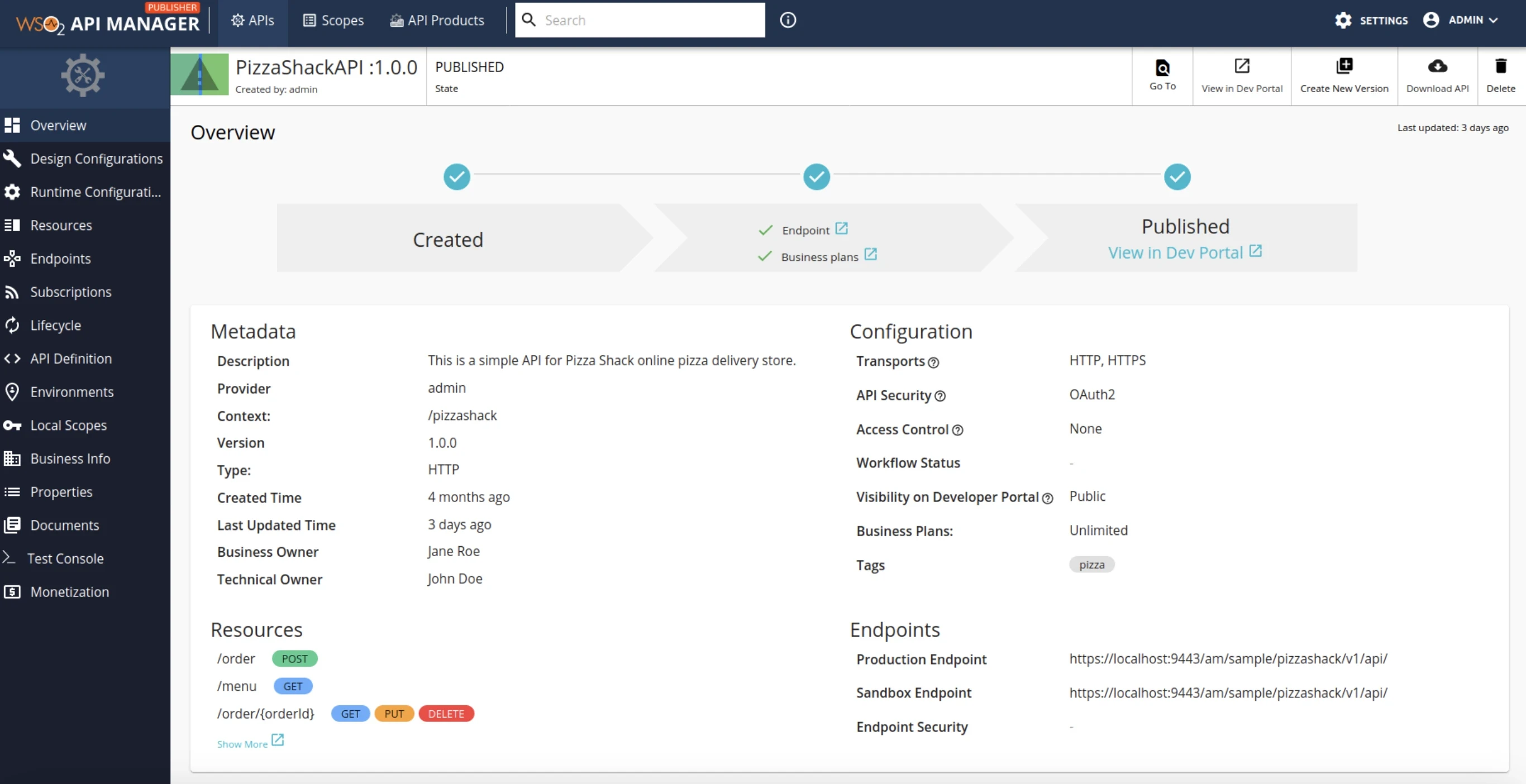
Image Source - WS02 API Manager
WSO2 API Manager is an all-inclusive, open-source platform not only for API discovery but also for complete lifecycle management of APIs. It enables organizations to design, publish, and manage APIs across cloud, on-premises, and hybrid environments for the seamless integration of and digital transformation.
Key Benefits
Full Lifecycle API Management: WSO2 API Manager helps in designing, prototyping, developing, publishing, and retiring APIs in the most efficient manner possible across their lifecycle.
Integration Capabilities: The platform provides
integration-first development, which enables users to expose integration services as managed APIs, thus streamlining the creation of comprehensive ecosystems.Security and Access Control: The tool supports various authentication mechanisms that include
API keys,mutual SSL, andOAuth 2.0, ensuring secure API interaction and robust access control.
Pricing
WSO2 offers a line of products and services tailored for various needs in API management:
WSO2 API Manager: This is an integrated core platform that allows developers to design, publish and manage APIs across different environments for on-premises cloud and hybrid architectures.
WSO2 API Platform for Kubernetes (WSO2 APK): Designed for Kubernetes environments, this platform facilitates the deployment of lightweight, container-native data plane instances, streamlining API management within Kubernetes ecosystems.
Choreo: A low-code, cloud-native
platform as a service(PaaS) that accelerates the building, deployment, and management of APIs, services, and integrations. Choreo is available on Microsoft Azure and enables the creation of APIs with minimal coding effort.
10. Azure API Management
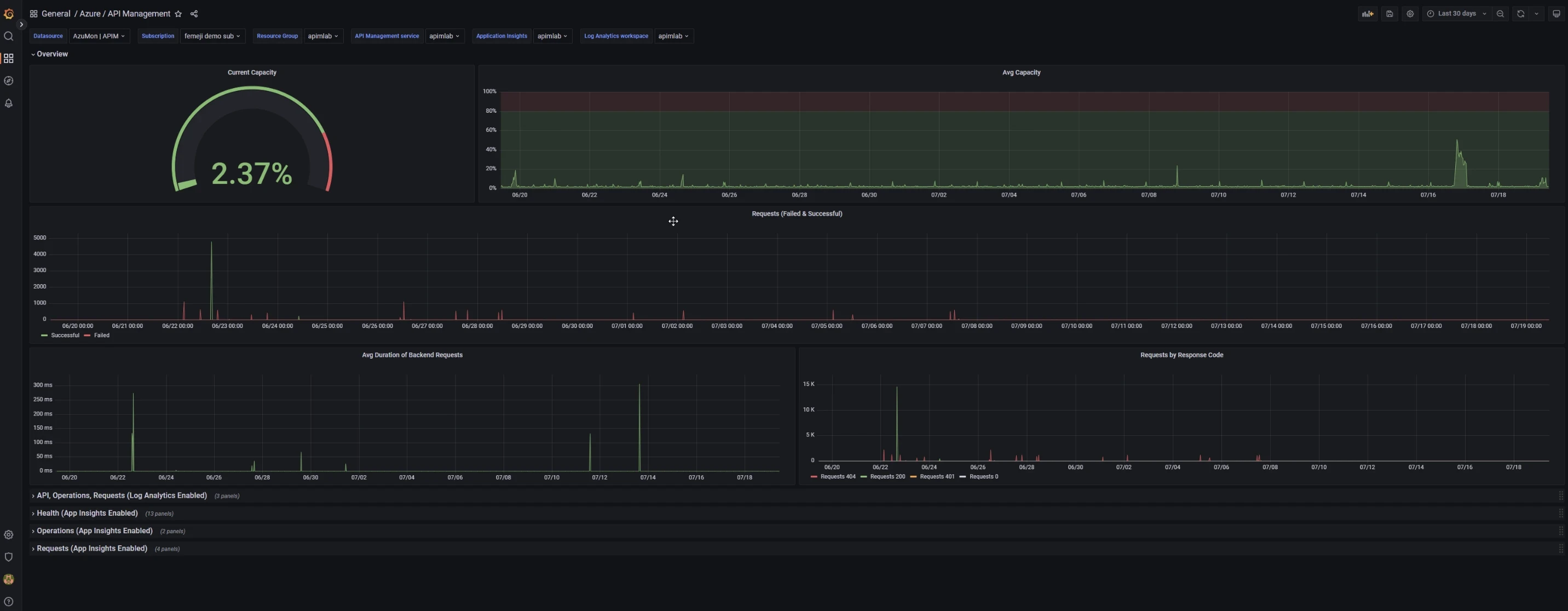
Image Source - Azure API Management
Azure API Management is a hybrid, multi-cloud platform to manage APIs across various environments. It allows the organization to securely discover, publish, monitor, and analyze APIs to integrate services and applications in a smooth manner.
Key Benefits
Comprehensive API Lifecycle Management: Azure API Management supports the full API lifecycle, from design to deployment and maintenance. This holistic approach ensures that teams are always monitoring and updating APIs, thereby enhancing their reliability and performance.
Security and Compliance: The platform offers strong security features, including authorization, authentication, and usage limits. These controls help safeguard data and services, making sure that the data and services comply with organizational policies and industry standards.
Scalability and Flexibility: Azure API Management comes with a variety of tiers with differentiated features to suit customers according to their requirements and needs. This helps in being scaleable for an organization. Depending on the particular organization needs and budget, this enables them to opt for that tier.
Developer Engagement: The platform consists of an open-source developer portal, which automatically generates customizable documentation of APIs. This makes it easy for developers to discover and consume APIs.
Pricing
Azure API Management offers four different pricing tiers to vary the organizational needs, of which each has unique feature and capacity. Here is a summary,
Consumption Tier: This serverless option is really suitable for applications with volatile traffic patterns. There are no fixed costs; they base it on the number of API operations, and the first million operations are included per subscription.
Developer Tier: This is the non-production usage plan. It's meant for testing and evaluation. It is priced around
$48.04 a month. No service-level agreement (SLA) is offered.Basic Tier: Basic tier is designed for the entry-level production scenario at about
$147.17 per month. It will support up to two units, and each additionalunit costs 50%of the first unit's price.Standard Tier: This tier is suitable for medium-volume production environments and costs around
$686.72 per month. It allows scaling up to four units, with each additional unit at half the cost of the initial unit.Premium Tier: Geared towards high-volume or enterprise-level production use, the Premium tier costs about
$2,795.17 per month. It supports scaling beyond four units, with each extra unit priced at 50% of the first unit's cost.Basic v2 and Standard v2 Tiers: These are introduced to enhance scalability and deployment speed. They are faster in provisioning and scaling. The Basic v2 tier is suitable for development and testing, while the Standard v2 caters to production workloads, with support for network-isolated backends. Details of pricing for these tiers are available on the Azure pricing page.
Premium v2 Tier: Currently in public preview, the Premium v2 tier provides enterprise features, including full virtual network isolation and higher scalability. For more information on pricing and regional availability, see the Azure API Management pricing page.
Key Features of API Discovery Tools
Here is a list of some vital features that make the API Discovery tool invaluable for organizations involved in managing complex API ecosystems.
1. Automated Discovery
This is the core feature for automatic discovery, which continues scanning the networks of the organization to identify public as well as private APIs. It considers all endpoints as this nature of the modern IT environment keeps on changing APIs so often. This process thus avoids human error and also maintains accuracy.
2. Comprehensive Scanning
Effective API discovery tools conduct full scans to identify all the APIs in use, including undocumented or shadow APIs. This helps organizations in checking their complete API environment.
3. Version Tracking
API Discovery tools monitor various versions of APIs and alert managers to any old versions that require updating. This feature provides the consistency of the system and the compatibility with earlier editions.
4. Usage Analytics
It provides a view of API usage, including how often they are used and the amount of data delivered. This allows to adjust performance and identify unusual or unauthorized access patterns that might mean a security breach.
5. Dependency Mapping
API discovery tool match various needs. The tools listed above offer features that help organizations manage their APIs effectively.
Types of API Discovery Tools
API discovery tools come in various types, every tool has different features to help organizations manage their APIs. Here are various types of API discovery tools:
Automated API Scanners
These tools continuously scan networks and applications to automatically find both documented and undocumented APIs. These tools ensures complete visibility of all the APIs in use, which reduces the risks associated with shadow APIs. Automated scanners are a must for an organization that wants to keep an up-to-date API inventory and find new or changed APIs.
API Security Platforms
These platforms have a focus on discovering APIs while also testing their vulnerability, such as weak authentication or exposed endpoints. The platform would integrate with the CI/CD pipeline, which does security checks across the full API lifecycle and helps detect security breaches in the early development stages.
API Management Platforms
These platforms offer complete API lifecycle management in discovery, security, and monitoring. The features include version control and real-time monitoring, enabling effective management of APIs through the development cycle to depreciation. API management tools ensure discoverability and security.
Network Traffic Analysis Tools
These tools monitor network traffic in order to discover APIs through the detection of communication patterns between services. They are useful for finding undocumented APIs or abnormalities, such as unauthorized access, by checking traffic data. This ensures that they are not missed or exposed any APIs to security risks.
API Documentation Generators
These tools automate the creation and updating of API documentation, making it easier for teams to understand and integrate APIs. By synchronizing with the API’s code or traffic, these tools ensure that documentation stays accurate, improving usability and reducing integration time.
Final Thoughts
Using the right API Discovery vendors can increase productivity, quick procedures, and ensure solid security measures are in place. Tools like Cloudflare, Postman, etc., allow efficient API management, encouraging team collaboration and reducing errors. Organizations can solve the difficulties of API development with greater ease by using these tools.
Akto facilitates API discovery while prioritizing security through real-time monitoring and automated security weakness testing. Organizations can use Akto to allow their security teams to innovate effectively while it ensures their API's security. Book a demo to learn more about Akto.
Want to learn more?
Subscribe to Akto's educational emails for essential insights on protecting your API ecosystem.

